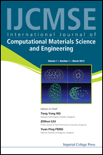
International Journal of Computational Materials Science and Engineering
Scope & Guideline
Pioneering research for a sustainable materials future.
Introduction
Aims and Scopes
- Computational Modeling and Simulation:
The journal emphasizes the development and application of computational models to predict the physical and mechanical properties of materials. This includes finite element analysis (FEA), molecular dynamics simulations, and density functional theory (DFT) to understand material behavior under various conditions. - Material Characterization:
A core focus is on the characterization of novel materials, including composites, nanomaterials, and functionally graded materials (FGMs). Research often involves experimental and computational comparisons to validate theoretical predictions and enhance material performance. - Thermal and Fluid Dynamics:
The journal frequently publishes studies on thermal and fluid dynamics in materials, particularly concerning heat transfer, fluid flow in porous media, and nanofluids. This includes the exploration of thermal properties and behaviors in both theoretical and experimental contexts. - Nanotechnology and Advanced Materials:
Research on nanomaterials, including their synthesis, properties, and applications, is a significant area. The journal highlights studies that investigate the unique characteristics of nanomaterials and their potential in various engineering applications. - Interdisciplinary Applications:
The journal promotes interdisciplinary research that connects materials science with fields such as mechanical engineering, civil engineering, and biomedical applications. This includes studies on the application of materials in real-world scenarios, such as structural integrity and environmental sustainability.
Trending and Emerging
- Hybrid and Composite Materials:
There is a growing emphasis on the study of hybrid and composite materials, particularly those reinforced with nanomaterials or bio-based fibers. This trend reflects the increasing interest in developing materials that offer enhanced performance and sustainability. - Advanced Computational Techniques:
The adoption of advanced computational techniques, such as machine learning and artificial intelligence in materials modeling and property prediction, is gaining traction. Researchers are exploring how these technologies can optimize material design and accelerate the discovery of new materials. - Multiphase and Multifunctional Materials:
Research on multiphase and multifunctional materials is on the rise, with studies focusing on materials that serve multiple purposes or exhibit complex behaviors under various conditions. This includes materials designed for specific applications in electronics, energy, and environmental fields. - Smart Materials and Structures:
There is an emerging interest in smart materials that respond dynamically to environmental changes. This includes research on piezoelectric materials and shape memory alloys, which are gaining attention for their applications in robotics and adaptive structures. - Sustainability and Environmental Impact:
A noticeable trend is the focus on sustainability and the environmental impact of materials. Researchers are increasingly exploring eco-friendly materials and processes, as well as the life cycle analysis of materials to assess their environmental footprint.
Declining or Waning
- Traditional Materials Science:
Research focused solely on traditional materials without computational methodologies is becoming less common. The journal appears to favor studies that integrate computational techniques with experimental validation, leading to a decline in purely theoretical or conventional materials studies. - Basic Mechanical Properties without Advanced Analysis:
There has been a noticeable reduction in publications that examine basic mechanical properties of materials without employing advanced analytical techniques. The trend is moving towards more sophisticated analyses involving multi-scale modeling and simulations. - Conventional Experimental Methods:
Papers relying solely on conventional experimental methods without the integration of computational approaches are declining. The journal is increasingly favoring studies that combine experimental and computational methodologies to provide a more comprehensive understanding of material behaviors.
Similar Journals
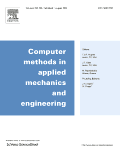
COMPUTER METHODS IN APPLIED MECHANICS AND ENGINEERING
Unveiling New Dimensions in Engineering through Computation.COMPUTER METHODS IN APPLIED MECHANICS AND ENGINEERING, published by Elsevier Science SA, is a premier journal that has significantly contributed to the fields of computational mechanics, computer science applications, mechanical engineering, and the mechanics of materials since its inception in 1972. With an ISSN of 0045-7825 and an E-ISSN of 1879-2138, this journal is recognized for its rigorous peer-review process and is consistently ranked in the Q1 quartile across multiple categories, including Computational Mechanics and Mechanical Engineering. Its impressive Scopus rankings place it in the top tiers of its field, with a percentile ranking of 98th in Computational Mechanics. Researchers, professionals, and students will find the journal's comprehensive scope and high-quality articles invaluable for advancing their knowledge and practices at the intersection of engineering and computation. Although not an open-access journal, its impactful contributions to both theoretical and applied research make it an essential resource for anyone involved in these dynamic fields.

COMPUTATIONAL MECHANICS
Pioneering Research in Applied Computational MethodsCOMPUTATIONAL MECHANICS, published by SPRINGER, is a premier international journal that focuses on the intersection of applied mathematics, engineering, and computational methods. With a commendable Q1 ranking in multiple categories, including Applied Mathematics and Mechanical Engineering, this journal is pivotal for disseminating groundbreaking research and innovative methodologies that advance the field. The journal has steadily contributed to the academic community since its inception in 1986 and continues to lead discussions and practices in computational mechanics and related disciplines. With a robust impact reflected in its Scopus rankings—placing it within the top percentiles across various categories—COMPUTATIONAL MECHANICS serves as a crucial platform for researchers, professionals, and students seeking to explore and contribute to significant advancements in computational theory and mathematical applications. Although it does not currently operate under an open access model, the journal ensures wide accessibility through libraries and institutional subscriptions, fostering a rich exchange of knowledge in the global scientific community.
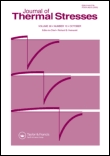
JOURNAL OF THERMAL STRESSES
Unlocking the Secrets of Thermal PhenomenaThe Journal of Thermal Stresses is a prestigious peer-reviewed journal published by Taylor & Francis Inc, dedicated to the exploration of thermal stress phenomena in materials and condensed matter physics. With a focus on enhancing our understanding of the implications of thermal stress on material performance and structural integrity, the journal serves as a critical resource for researchers and professionals alike. Established in 1978, the journal has a converged timeline extending through 2024 and is recognized in the academic community for its significant contributions, boasting rankings in the 69th percentile in Condensed Matter Physics and the 61st percentile in General Materials Science according to Scopus. Although not an open-access publication, it offers a wealth of valuable insights and advancements for those engaged in the study of thermal dynamics and related fields, affirming its role as a vital platform for knowledge dissemination among scholars and practitioners.
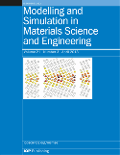
MODELLING AND SIMULATION IN MATERIALS SCIENCE AND ENGINEERING
Exploring Complex Interactions Through SimulationMODELLING AND SIMULATION IN MATERIALS SCIENCE AND ENGINEERING, published by IOP Publishing Ltd, serves as a vital resource for researchers, professionals, and students engaged in the multifaceted fields of materials science, condensed matter physics, and computational mechanics. Since its inception in 1992, this journal has been committed to advancing knowledge through high-quality research articles, reviews, and simulations that explore complex interactions within materials. With an impressive Scopus rank in multiple categories, including Q2 in Materials Science and Mechanics of Materials, it reflects its significant influence and relevance in the academic community. Though not an open-access journal, it provides critical insights and developments in modeling techniques and simulations aimed at improving material performance and understanding thermodynamic processes, making it an essential read for those at the forefront of materials innovation. As it continues to expand its scope and reach into 2024 and beyond, MODELLING AND SIMULATION IN MATERIALS SCIENCE AND ENGINEERING remains a key platform for disseminating groundbreaking research that shapes the future of the discipline.

ARCHIVES OF MECHANICS
Advancing the Frontiers of Mechanics and PhysicsArchives of Mechanics, published by the Polish Academy of Sciences Institute of Fundamental Technological Research, is a distinguished open-access journal established in 1971 that has played a pivotal role in the dissemination of knowledge in the fields of Mechanical Engineering and Condensed Matter Physics. With its commitment to accessibility since adopting open access in 2022, this journal provides a platform for researchers, professionals, and students to share cutting-edge research findings and innovative methodologies. Although it currently holds a Q4 ranking in Condensed Matter Physics and a Q3 ranking in Mechanical Engineering for 2023, its comprehensive scope, which spans critical advancements in mechanical systems and materials science, positions it as a valuable resource for the academic community. Located in Warsaw, Poland, the journal continues to contribute significantly to the global discourse on mechanics and is dedicated to fostering new ideas that advance both theoretical and applied aspects of the discipline.

Journal of Computational Applied Mechanics
Empowering Global Collaboration in Mechanics of MaterialsJournal of Computational Applied Mechanics, published by UNIV TEHRAN, DANISHGAH-I TIHRAN, is an influential open-access journal that has been disseminating significant research findings since its inception in 2012. With a dedicated focus on the fields of Computational Mechanics, Mechanical Engineering, and Mechanics of Materials, this journal has garnered a Q3 ranking in multiple relevant categories as of 2023, indicating its burgeoning impact within the academic community. Although precise HIndex scores are currently unavailable, the journal's recognition is underscored by its Scopus rankings, placing it in the middle tier among its peers. The journal invites researchers, professionals, and students to contribute to and engage with the continually evolving discourse in applied mechanics, fostering innovation through the dissemination of quality research. As an open-access journal, it ensures that findings are readily accessible to a global audience, thereby enhancing collaboration and knowledge sharing in the scientific community.

International Journal of Mechanics and Materials in Design
Exploring New Horizons in Mechanical Engineering and Materials ScienceInternational Journal of Mechanics and Materials in Design is a leading publication in the field of mechanical engineering and materials science, published by Springer Heidelberg. With an impressive impact factor, it holds esteemed rankings as Q1 in both Mechanical Engineering and Mechanics of Materials, and Q2 in Materials Science for the year 2023, solidifying its reputation as a significant contributor to the advancement of design methodologies. The journal focuses on the intersection of mechanics and materials, encouraging innovative research that addresses contemporary challenges faced in engineering disciplines. Researchers and professionals alike can benefit from accessing cutting-edge studies contributing to various applications, making it an invaluable resource for staying informed in this dynamic field. While the journal operates under a subscription model, its comprehensive reviews and high-quality original research foster a deeper understanding of material behavior and design principles, thus supporting the academic growth and professional development of its readers.
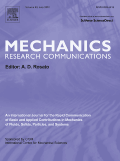
MECHANICS RESEARCH COMMUNICATIONS
Catalyzing Progress in Mechanics and MaterialsMECHANICS RESEARCH COMMUNICATIONS, published by PERGAMON-ELSEVIER SCIENCE LTD, is a prestigious journal in the fields of Civil and Structural Engineering, Condensed Matter Physics, Materials Science, and Mechanical Engineering. With an ISSN of 0093-6413 and E-ISSN of 1873-3972, it has made significant contributions to the understanding and advancement of mechanics and materials since its inception in 1974. The journal is well-regarded in academia, holding a Q2 ranking across multiple categories as of 2023, and ranking in the 65th percentile for Mechanical Engineering. Researchers and professionals benefit from its peer-reviewed content, which includes a wide range of articles from fundamental research to applied technological developments. Although currently not an open access journal, it remains a vital resource for those focused on innovating within the engineering and materials science domains. With its established legacy, MECHANICS RESEARCH COMMUNICATIONS continues to shape the discourse in mechanics and engineering, making it essential reading for students and practitioners alike.

Journal of Applied Mechanics and Technical Physics
Fostering Dialogue in the Heart of Technical PhysicsJournal of Applied Mechanics and Technical Physics is a distinguished publication that serves as a vital resource for researchers and professionals in the realms of mechanical engineering, mechanics of materials, and condensed matter physics. Published by MAIK NAUKA/INTERPERIODICA/SPRINGER, this journal has been committed to disseminating high-quality research since its inception in 1965. With a noted presence in the academic community, it holds a respectable Q3 ranking in multiple categories as of 2023, indicating its relevance and contribution to the field. Although it does not currently offer open access, the journal provides valuable insights and advancements through its rigorous peer-review process. Covering a broad spectrum of topics in applied mechanics and technical physics, it aims to foster innovation and dialogue among scientists, engineers, and scholars alike. Located in the United States, the journal continues to make significant strides in bridging the gap between theoretical research and practical applications, making it an essential read for anyone engaged in these dynamic fields.
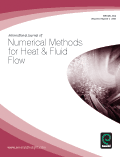
INTERNATIONAL JOURNAL OF NUMERICAL METHODS FOR HEAT & FLUID FLOW
Advancing the Frontiers of Heat and Fluid Dynamics.INTERNATIONAL JOURNAL OF NUMERICAL METHODS FOR HEAT & FLUID FLOW, published by EMERALD GROUP PUBLISHING LTD, is a premier platform dedicated to advancing the field of numerical methods applied to heat and fluid flow analysis. With an ISSN of 0961-5539 and an E-ISSN of 1758-6585, this journal has been a vital resource since its inception in 1991, covering cutting-edge research right up to 2024. It is highly regarded within various disciplines, as evidenced by its impressive ranking in the 2023 Scopus categories, which places it in the Q1 tier for Computational Mechanics and a Q2 tier for Aerospace Engineering and Mechanical Engineering. This authoritative journal holds significant importance for researchers, professionals, and students who are keen on expanding their knowledge and addressing challenges in thermal and fluid dynamics through innovative computational techniques. Although the journal does not provide Open Access options, its rigorous peer-review process and high-impact publication standards ensure that it remains an essential tool for those involved in engineering advancements and applied mathematics.